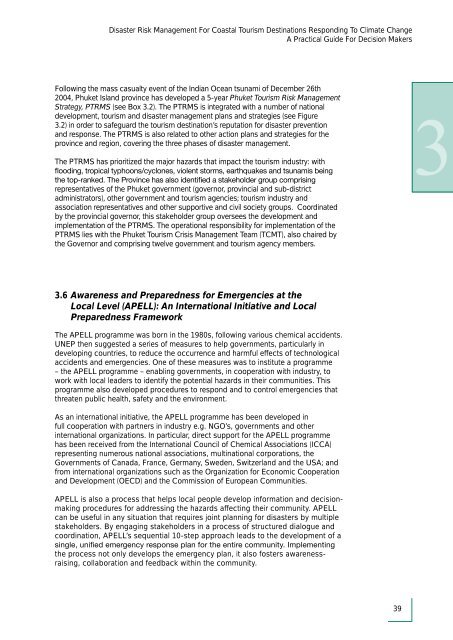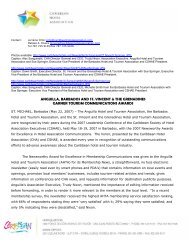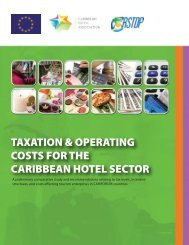Disaster Risk Management for Coastal Tourism - Caribbean Hotel ...
Disaster Risk Management for Coastal Tourism - Caribbean Hotel ...
Disaster Risk Management for Coastal Tourism - Caribbean Hotel ...
Create successful ePaper yourself
Turn your PDF publications into a flip-book with our unique Google optimized e-Paper software.
<strong>Disaster</strong> <strong>Risk</strong> <strong>Management</strong> For <strong>Coastal</strong> <strong>Tourism</strong> Destinations Responding To Climate Change<br />
A Practical Guide For Decision Makers<br />
Following the mass casualty event of the Indian Ocean tsunami of December 26th<br />
2004, Phuket Island province has developed a 5-year Phuket <strong>Tourism</strong> <strong>Risk</strong> <strong>Management</strong><br />
Strategy, PTRMS (see Box 3.2). The PTRMS is integrated with a number of national<br />
development, tourism and disaster management plans and strategies (see Figure<br />
3.2) in order to safeguard the tourism destination’s reputation <strong>for</strong> disaster prevention<br />
and response. The PTRMS is also related to other action plans and strategies <strong>for</strong> the<br />
province and region, covering the three phases of disaster management.<br />
The PTRMS has prioritized the major hazards that impact the tourism industry: with<br />
<br />
<br />
representatives of the Phuket government (governor, provincial and sub-district<br />
administrators), other government and tourism agencies; tourism industry and<br />
association representatives and other supportive and civil society groups. Coordinated<br />
by the provincial governor, this stakeholder group oversees the development and<br />
implementation of the PTRMS. The operational responsibility <strong>for</strong> implementation of the<br />
PTRMS lies with the Phuket <strong>Tourism</strong> Crisis <strong>Management</strong> Team (TCMT), also chaired by<br />
the Governor and comprising twelve government and tourism agency members.<br />
3<br />
3.6 Awareness and Preparedness <strong>for</strong> Emergencies at the<br />
Local Level (APELL): An International Initiative and Local<br />
Preparedness Framework<br />
The APELL programme was born in the 1980s, following various chemical accidents.<br />
UNEP then suggested a series of measures to help governments, particularly in<br />
developing countries, to reduce the occurrence and harmful effects of technological<br />
accidents and emergencies. One of these measures was to institute a programme<br />
– the APELL programme – enabling governments, in cooperation with industry, to<br />
work with local leaders to identify the potential hazards in their communities. This<br />
programme also developed procedures to respond and to control emergencies that<br />
threaten public health, safety and the environment.<br />
As an international initiative, the APELL programme has been developed in<br />
full cooperation with partners in industry e.g. NGO’s, governments and other<br />
international organizations. In particular, direct support <strong>for</strong> the APELL programme<br />
has been received from the International Council of Chemical Associations (ICCA)<br />
representing numerous national associations, multinational corporations, the<br />
Governments of Canada, France, Germany, Sweden, Switzerland and the USA; and<br />
from international organizations such as the Organization <strong>for</strong> Economic Cooperation<br />
and Development (OECD) and the Commission of European Communities.<br />
APELL is also a process that helps local people develop in<strong>for</strong>mation and decisionmaking<br />
procedures <strong>for</strong> addressing the hazards affecting their community. APELL<br />
can be useful in any situation that requires joint planning <strong>for</strong> disasters by multiple<br />
stakeholders. By engaging stakeholders in a process of structured dialogue and<br />
coordination, APELL’s sequential 10-step approach leads to the development of a<br />
<br />
the process not only develops the emergency plan, it also fosters awarenessraising,<br />
collaboration and feedback within the community.<br />
39








